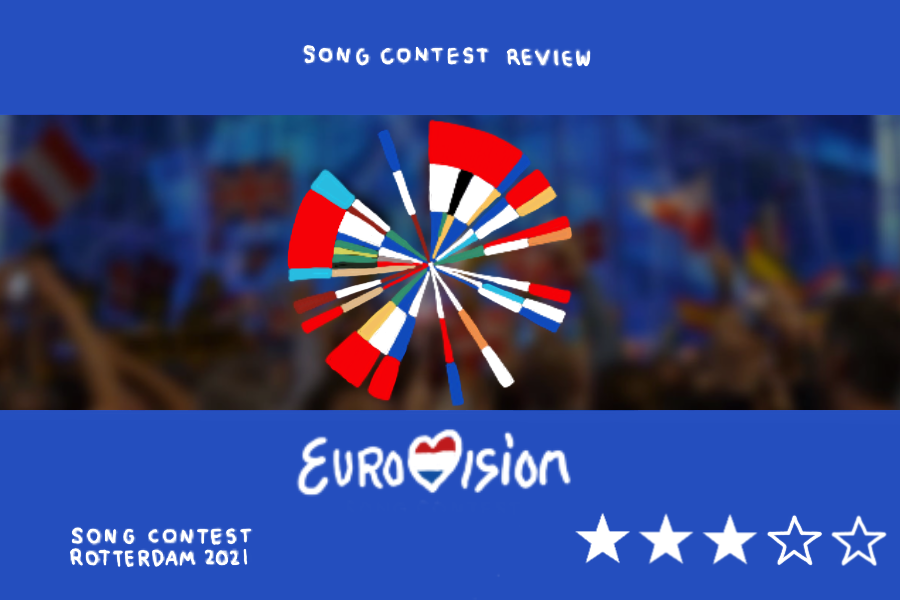Variety of genres offer strong contenders for Eurovision 2021
Eurovision is a European song contest in which multiple countries submit one entry each to compete against each other. The Sidekick editor-in-chief Sally Parampottil reviews this year’s entries and gives some pointers for interested Americans who recently learned of the contest’s existence.
May 12, 2021
Are you an American intrigued by the contest which “Eurovision Song Contest: The Story of Fire Saga” is based off of? Well, get ready for all the fun of Eurovision without any of the Will Ferrell, fake accents and murder because Eurovision 2021 is here.
The song contest is May 18, 20 and 22 in Rotterdam, as the most recent winner (Duncan Laurence with the TikTok-viral song “Arcade”) represented the Netherlands in 2019, as 2020’s contest was canceled due to COVID-19. With 39 competing countries, there is a lot to look forward to when it comes time for live performances. Until then, a listen-through of all the entries give a good idea on who to look out for when the contest begins.
While admittedly, last year’s entries disappointed, upon listening to the official Spotify playlist, I am pleased to say this year did much better. I can name a handful I could see winning in a range of genres.
One which immediately caught my attention was France’s entry, “Voilà” by Barbara Pravi, which is my favorite to win. The story of a woman escaping the confines of insecurity (in which Pravi channels her own past as a victim of domestic violence) is told through a chanson-style masterpiece. The swell of emotion is understood by even those who do not speak French and cannot appreciate the intense lyrics that demand recognition for “this girl with black eyes and her crazy dream.”
In a completely different genre, Italy entered rock group Måneskin with the song “ZITTI E BUONI.” This bold move goes against past years, which have leaned towards the pop side. I have adored Italy’s entries nearly every year, and though this year’s entry breaks the mold, it was catchy and aggressively energetic.
Similar in energy is the host country Netherland’s entry, Jeangu Macrooy’s “Birth of a New Age.” Macrooy ties in sounds from his native country Suriname, as well as a catchy repetition of “No wan man e broko mi” (part of the Surinamese saying “Mi na afu sensi, no wan man e broko mi” that translates to “I’m half a cent, you can’t break me”), which creates an upbeat inspiring song of perseverance against oppressive forces. While the powerful lyrics may resonate with people of color who have dealt with the effects of past colonialism, specifically lines like “They buried your gods, they imprisoned your thoughts” and “They tried to drain you of your faith, but you are the rage that melts the chains,” I would not be surprised if this unfortunately does not connect with a majority of the European audience to bring enough points for a high finish.
Macrooy was one of multiple artists returning from last year’s canceled competition, as performers were allowed to compete again this year albeit with a different song.
Australia (which competes in Eurovision for a reason I still don’t know) was my choice to win last year with Montaigne’s “Don’t Break Me.” Montaigne returns with “Technicolor,” which is a fun song, though its hyperpop sound is a little more jarring in a sense that may hinder its run. VICTORIA, representing Bulgaria with “growing up is getting old,” is still a strong contender with her airy vocals and touching lyrics, but it is the same quality as her previous entry, “Tears Getting Sober,” and stands out a bit less against this year’s stronger competitors.
And of course, in my list of favored entries, I cannot ignore my good man TIX from Norway. Bullied as a child for his Tourette’s Syndrome, Andreas Haukeland would eventually adopt “TIX” as his stage name and is competing with “Fallen Angel.” Is his entry a basic pop song? Yes. Is his angel wing/fur coat/sunglasses/headband/chains costume on the nose, over the top and cheesy? Yes. Do I prefer the Norwegian version over the English entry (mainly due to the lyrical complexity sacrificed in the translation)? Yes. But you know what? The song is catchy and cute, and I’m an American; if there’s one thing Americans love, it’s a good underdog story. So, even though I doubt he will win, if TIX pulls it off, I will have no complaints.
Fly high, TIX. Fly high.
As with any Eurovision, there is a vast sea of mediocrity to never be listened to again following the first run through. To Americans giving the contest a listen for the first time, don’t be surprised if you end up not liking or remembering half of the songs you heard. Though not the best year by far, as said mediocre songs tend to drag down my cumulative rating, it was indeed a drastic improvement from last year, and I look forward to watching these entries come to life in the Netherlands later this month.
Follow Sally (@SParampottil) and @CHSCampusNews on Twitter.











